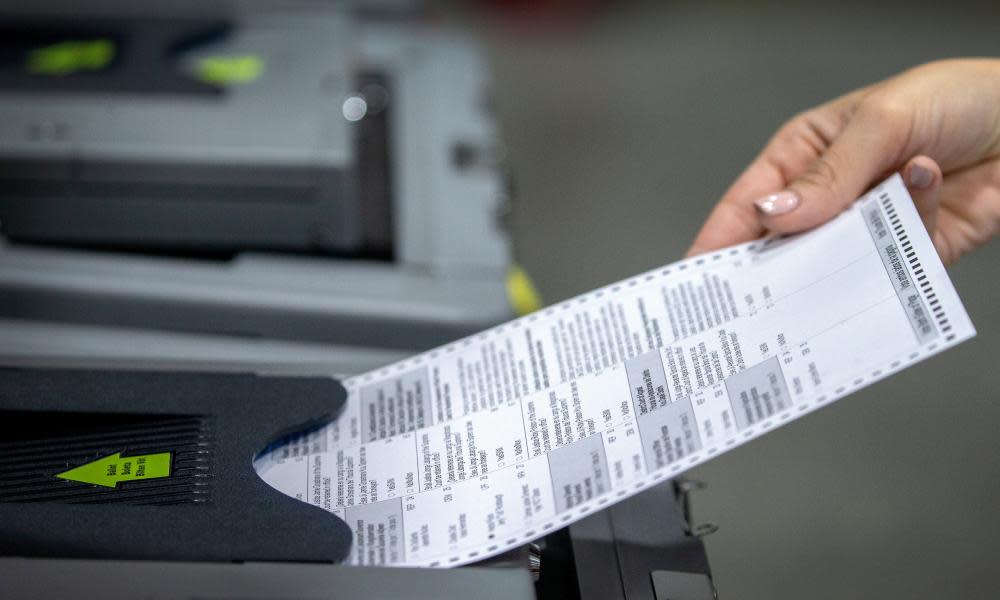Miami judge dismisses voter fraud case trumpeted by DeSantis

- Oops!Something went wrong.Please try again later.
A Miami judge on Friday dismissed one of the 19 voter fraud prosecutions loudly trumpeted by Florida’s governor, Ron DeSantis, a significant development that comes as the cases draw scrutiny.
The case on Friday involved Robert Lee Wood, a 56-year-old Miami man who registered to vote in 2020 and voted in the presidential election last year. State prosecutors indicted Wood, who is Black, saying he registered and voted knowing he was ineligible. He was ineligible because he was convicted in 1991, but Wood said he did not know that. He registered in 2020 when he was approached by a canvasser and was sent a voter registration card by the state.
Judge Milton Hirsch dismissed the case on Friday. Wood was charged with two third degree felonies, each punishable by up to five years in prison and a $5,000 fine.
The prosecutions, all of which involve people with prior felony convictions, have come under intense scrutiny. Several of those charged have said they did not know they couldn’t vote and were not informed of their ineligibility until after they voted.
Hirsch dismissed the case because he said statewide prosecutors had overstepped their authority in bringing charges against Wood.
In a request to dismiss the case, Wood’s attorney argued that the statewide prosecutor’s office, which is handling all 19 cases, didn’t have the authority to handle the case. In Florida, the statewide prosecutor is authorized to handle only cases that involve criminal conduct in two or more of the state’s judicial circuits. But Wood registered and voted in a single place, Miami.
Prosecutors argued that Wood committed a multi-jurisdictional criminal act. Even though he registered and voted in Miami, his registration was transmitted to the state capitol, Tallahassee, for review. The criminal act, the state argued, was therefore committed in two jurisdictions. In its argument, the statewide prosecutors argued they had authority to prosecute election crimes anywhere in Florida.
Hirsch disagreed, saying “the crime, if there was one, occurred exclusively in Miami.”
“Robert Lee Wood’s misconduct, if misconduct it was, consisted in registering to vote, and voting, in his county of residence. Yes, his voter application and his ballot were transported to another Florida jurisdiction. But they were not transported by him, nor by any putatively criminal co-perpetrator,” he wrote in his ruling. “Even assuming that Mr Wood’s passive role in the transmission of his voter application form and completed ballot to Tallahassee is ‘activity’ that can be ascribed to him, it is not his ‘criminal activity’.”
In 2018, Florida voters passed a constitutional amendment that restored voting rights to people with felonies, except those convicted of murder and sexual offenses. Some of those charged have said they believed the amendment restored their voting rights. The state has yet to provide evidence showing that any of the defendants, all of whom have prior murder or sexual offenses, knew they were exempt from the amendment.
Body camera footage of some of the defendants being arrested in Hillsborough county obtained by the Guardian and the Tampa Bay Times showed their bewilderment as they were put in handcuffs over voter fraud charges.
A spokesperson for Florida attorney general Ashley Moody, a Republican who appoints the statewide prosecutor, said her office would appeal the ruling.
“We believe this was an incorrect analysis of jurisdiction and OSP will appeal,” Nicholas Cox, the statewide prosecutor, said in a statement.
“Given that elections violations of this nature impact all Florida voters, elections officials, state government, and the integrity of our republic, we continue to view the Florida Office of Statewide Prosecution as the appropriate agency to prosecute these crimes,” Bryan Griffin, a DeSantis spokesman, said in a statement. “The state will continue to enforce the law and ensure that murderers and rapists who are not permitted to vote do not unlawfully do so. Florida will not be a state in which elections are left vulnerable or cheaters unaccountable.”
Lawyers representing several of the other defendants have filed similar motions in other counties in the state. Friday’s motion is significant because the other attorneys will likely use it to bolster their cases.
“The lawyers that are working with these 20 defendants, they’re all aware of the motions that were filed in this case and are now aware of the order that was entered,” said Larry Davis, Wood’s attorney. “I believe his decision will carry weight not only in his own circuit but in circuits around the state.”
DeSantis held a press conference in August to announce the charges. Flanked by uniformed law enforcement, the governor described it as the “opening salvo” of a new office dedicated to combatting voter fraud, which is rare.
“They did not go through any process, they did not get their rights restored, and yet they went ahead and voted anyways. That is against the law and now they’re gonna pay the price for it.”

